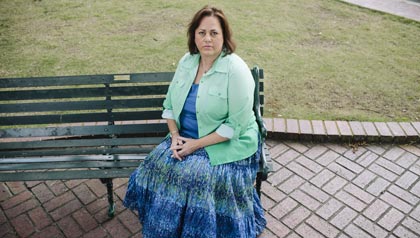AARP Hearing Center

By Katrina Goggins
Carla Cozart says she now knows the value of asking tough questions and holding health care providers accountable.
After insisting that one ovary be left intact during her hysterectomy five years ago, she awoke to find both ovaries had been removed.
The 52-year-old Abbeville high school teacher never filed a complaint but now offers this advice to friends: “If you find yourself with concerns about your care and you’re lying in the bed in the aftermath, fire the doctor—immediately. You have the right to good care.”
AARP South Carolina hopes new health care safety information provided by a national nonprofit group and an upcoming patient safety seminar will increase the number of well-informed, proactive patients.
“Many of us could land in the hospital for any number of reasons, especially as we get older,” said Teresa Arnold, AARP South Carolina state director. “So knowing how to protect yourself could help prevent hospital errors or infections.”
Education campaign
South Carolina is one of five states selected by the Informed Patient Institute (IPI) for a campaign to educate residents about how they can help prevent hospital infections.
Available online at informedpatientinstitute.org, the campaign’s tip sheets provide information specific to South Carolina about keys to quality care in hospitals, in nursing homes and from doctors. They also provide state-specific details about patient rights.
Key tip: Try first to fix concerns with the people directly caring for you. If results are not satisfactory, patients should then file a complaint with the hospital and with an outside entity like the state Department of Health and Environmental Control (DHEC).
Patients need to take a direct role in ensuring their safety. “A lot of times patients feel uncomfortable asking questions, so they say nothing,” said Kathleen Antonetti, M.D., with DHEC. She noted that simple steps like asking health care workers to wash their hands before touching you can make a big difference.
“One of the easiest, but still effective, ways to protect oneself is to wipe down every surface in the hospital room with a disposable wipe with bleach,” Arnold said.
The health care system can be difficult to navigate, especially during an illness, and many patients aren’t prepared to advocate for themselves when things go wrong, said Carol Cronin, IPI executive director.
“Most of us expect that we’re going to get high-quality care, so when that doesn’t happen, people are surprised and often don’t know where to start. Our tip sheets are designed to help people with the process so that they do receive the care they need,” Cronin said.
AARP South Carolina will distribute IPI materials at various events throughout the year.
During a Sept. 6 seminar in Spartanburg, medical, consumer and legal experts will offer patient safety information, including simple steps to prevent infections. There is no charge, but attendees must register at aarp.cvent.com/scpatient or by calling 866-389-5655 toll-free.
State making progress
Within the last decade, the passage of state laws and the implementation of education and hospital safety initiatives have helped improve patient safety in South Carolina, advocates say.
The South Carolina Hospital Association has adopted the World Health Organization’s Surgical Safety Checklist, proven to reduce surgery-related complications.
State patient safety laws passed in 2005 and 2006 make it easier for patients to contact a doctor and require hospitals to report infections acquired at their facilities.
This year’s report showed a 12 percent decrease from 2011 to 2012 in a common type of hospital-acquired blood infection.
Katrina Goggins is a writer living in Columbia, S.C.































































